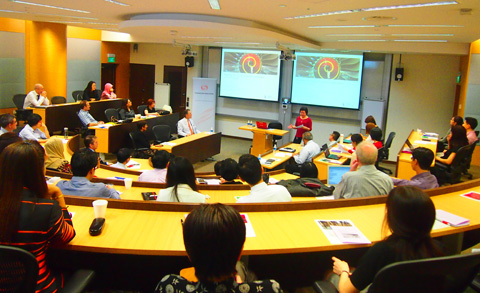
Together with Thomson Reuters, SMU’s Office of the Provost, Office of Research and Li Ka Shing Library organised the seminar “Social Science Research Landscape – Past, Present, and Future Outlook” on 27 May 2014. Drawing over 60 attendees from both local and foreign universities and government agencies, the seminar examined ways of mapping the structure and dynamics of social science research, as well as the use of translational research in public policy engagement.
Vital to sustaining and promoting communities, social science research not only promotes individual and societal well-being, but also drives new ideas and innovations. However, the work and impact of social science research are often difficult to map, measure and evaluate. Keynote speaker and bibliometrics expert with Thomson Reuters, David Pendlebury explained how the application of bibliometric techniques (i.e., statistical methods that are used to analyse the impact of academic literature) to social sciences would present a different set of challenges, as compared to the use of science mapping and scientometrics in the natural sciences.
Firstly, social scientists tend to publish in books (including monographs and book chapters), national publications, and non-scholarly media other than journals. As a result, the significance of non-journal literature must be considered. Secondly, the diversity of approaches and schools of thought within the social sciences means that the style of discourse, and meaning of citations are not uniform. Despite such characteristics and slow citation accumulation, social science publications are an important vehicle for scholarly communication because they are more transdisciplinary, attract more citations and enjoy a longer shelf life.
He went on to demonstrate how bibliographic coupling, thematic clustering, and visualisation tools could be used to map social science research areas and activities. He noted that research dynamics and the use of bibliometric data to create socio-cognitive maps had come of age in the last decade, offering policymakers, funders and managers new tools to support decisions about allocating research resources.
A primary impetus was the identification of emerging research areas, as well as influential institutional and individual researchers to inform strategies for research policy and planning, focused funding and collaboration. However, he cautioned that bibliometrics data and scientific maps were descriptive rather than prescriptive. In all cases, quantitative analysis using bibliometrics should be coupled with qualitative expert knowledge and researchers’ interpretations in order to yield valid conclusions upon which to base policy, funding and management decisions.
In his summary, Mr Pendlebury highlighted that social science research could, to varying degrees, be treated in a manner similar to the natural sciences only if special efforts were made to: (i) extend the types of publication outputs considered; (ii) appreciate the different nature of scholarly discourse (including citations) of the social sciences from the natural sciences; and (iii) recognise the broader research goals of many social scientists.
The latter half of the seminar featured an insightful analysis of how social science research had begun to influence policy planning in Singapore. Eloquently delivered by SMU’s Professor of Psychology and Director of Behavioural Sciences Institute David Chan, he gave interesting examples of social tension arising from immigration policies, in an attempt to illustrate the on-going challenges and changes to Singapore’s socio-political landscape. He explained how social science research would be useful in addressing such issues, particularly through the lens of local context. He also underscored the need to develop enabling conditions for conducting and applying research capable of achieving translational impact. Sharing his vast advisory experience in policy planning, he gave a realistic overview of the opportunities and challenges involved in working with government agencies, in an attempt to encourage his peers to lend their expertise to the shaping of national policies. He then concluded his presentation by highlighting the importance of conducting social science research in an ethical manner.
Back to Research@SMU Issue 15 (Jun 2014)
See More News
Want to see more of SMU Research?
Sign up for Research@SMU e-newslettter to know more about our research and research-related events!
If you would like to remove yourself from all our mailing list, please visit https://eservices.smu.edu.sg/internet/DNC/Default.aspx

